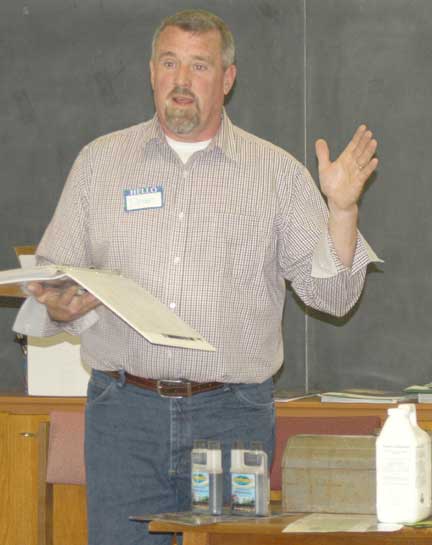Forum urges return to Mother Nature’s origins

WHOLESOME TALK — Envirosense owner Dean Goette addresses the crowd gathered at the South Central Sustainable Farming Association meeting held March 17 in Clarks Grove. (Star Eagle photo by Rachel Rietsema)
By RACHEL RIETSEMA
Staff Writer
They may not all sport Pioneer hats and overalls, but the South Central Sustainable Farming Association members still have one particular farming goal in mind: to wave back in an older, more wholesome food chapter.
“I don’t want to criticize, or be a martyr or crusader,” said Dean Goette, keynote speaker at the chapter’s March 17 meeting. “Mother nature is infallible. If we work with her, it’s amazing what happens.”
An advocate of three major soil companies, this Envirosense owner knows the pitfalls of processed food backwards and forwards. But, in order to spur change, big doses of teamwork and ingenuity must occur.
“We are what we eat,” Goette said. “Our cows and sows are no different.”
Fellow keynote speaker Jim Stiles, owner of Austin’s Superfresh, is just as enthusiastic about returning to Mother Nature’s origins.
“I love these great local things we get from suppliers,” Stiles said. “It would be awesome if I had somebody I could buy grapes from. Even pears and plums would be great.”
His business partner and wife Merlene added, “We try to find produce items that are unique. The Missouri peaches we have are good and nutritious for people.”
Stiles and Goette couldn’t be more on the same page. Even the silent audience members frequently nodded their heads in agreement.
“The sustainable farmers need to be with people that are excellent with retail,” Merlene said. “If we can form a partnership and provide a wonderful product for people, that’s a win win situation.”
Optimistic for the future, Goette yearns to once again redefine the word sustainable for the food market as a whole.
“We as a nation are sustainable when we follow regenerative actions and practices,” Goette said. “I’m not a chemist and I don’t understand all the biology, but if we come together on this, we can make a bigger footprint.”
While genuinely saddened by society’s eating habits, he also desperately wants to restore the Earth’s soil back to what God intended. And that’s what he strives for every day.
“We have done so many negatives to get this thing out of whack,” Goette said. “We have demineralized and depleted our soil values. We must get back into the game and restore Mother Nature.”
Even the littlest of efforts made by many can impact the planet. Stiles can attest to that fact, as he has seen the effects of Superfresh’s high efficient light bulbs and recycling of plastic bags and cardboard.
“After getting to know chapter leader Jim Tjepkema and coming to these meetings, things started really gelling for us,” Jim said. “We also have organic pork and beef from local farmers at our store.”
Yet, in spite of the improvements made produce and appearance wise, this jolly grocer still dreams of decades past.
“Back in the '80s and '90s, we sold 100 cases of bananas a week,” Jim said. “Now we sell about eight. I also remember saying, ‘Go get eight pallets of 50 pound potatoes.’ We sold those in a month. I haven’t sold a 50 pound potato in years.”
Those realities may be of yesteryear, but who’s to label that aspiration impossible?
“We can all work together on this,” Jim said. “Nobody is an island. The opportunities are endless.”
Final keynote speaker Linda Mesche, founder of Rural Advantage also thrives off the power of possibilities. Actually, Mesche continues to fine-tune her multiple plans to restore water quality.
“We can do this creatively,” said Meschke. “Rural Advantage has many initiatives, the third crop initiative, Madelia Model, EcoPayPack and the Farm2Cafeteria Network.”
The logistics of this Fairmont operation may be a bit complicated, but what matters most is that a difference is being made.
“Our mission is to promote the connections between agriculture, the environment and rural communities in order to improve ecological health, economic viability and rural vitality.”
Goette concluded, “This is such a big deal and it’s much bigger than me.”
